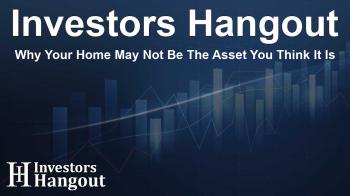Why Your Home May Not Be The Asset You Think It Is

Challenging Traditional Views on Homeownership
For many, homeownership has long been viewed as a fundamental element of wealth creation and the quintessential American dream. However, Robert Kiyosaki, renowned author of 'Rich Dad Poor Dad,' presents a controversial perspective: your home may not be the asset you believe it to be. Kiyosaki asserts that, despite the emotional and financial investments people make in their houses, the reality of property taxes means the government retains a continual financial stake in your property.
The Burden of Property Taxes
Kiyosaki's viewpoint is based on the idea that if an item costs you money consistently rather than generating income, it is not an asset. He emphasizes the ongoing expenses associated with homeownership, including mortgage payments, maintenance, utilities, and significantly, property taxes. Even once a homeowner pays off their mortgage, the obligation to pay property taxes remains.
Understanding Property Taxes
Property taxes are levied by local governments based on the assessed value of a home. These taxes are vital for funding public services such as education, infrastructure, and safety, but they also represent a lifelong financial commitment. Failure to pay these taxes can lead to severe consequences, including liens on your property and, in extreme situations, the government may seize the house to recover unpaid taxes.
The Illusion of Ownership
The crux of Kiyosaki's assertion lies in the sobering realization that true ownership may be an illusion. Technically, homeowners hold the title to their properties; however, as long as the government imposes property taxes, it claims a significant financial interest in your home. This arrangement can be disheartening for many, prompting a reevaluation of what it means to own a home.
Exceptions to the Rule
While Kiyosaki's argument holds for many, it's essential to recognize that some states offer tax breaks or exemptions for certain demographics, including senior citizens and veterans. Additionally, some areas have homestead protections that limit the increase of property taxes. However, these measures are not universal, leaving most homeowners facing substantial and ongoing tax payments.
Investment Properties vs. Primary Residences
Kiyosaki does not advise against real estate but draws a crucial distinction between primary residences and investment properties. Unlike a home that serves primarily as a living space, investment properties can generate rental income while appreciating in value over time. This ability to produce income transforms them into genuine assets, contrary to how many view their homes.
Revisiting the Concept of Homeownership
The discussion prompted by Kiyosaki's assertions challenges the long-held belief that homeownership is an essential financial milestone. Many individuals invest in homes believing they secure a stable future, but Kiyosaki encourages a re-examination of this narrative. Unless a home generates income, he posits, it should not be classified as an investment but rather viewed as a liability.
Reflecting on the Value of Homeownership
This perspective raises critical questions about the perception of homeownership. How does it alter your view of your most significant purchase? Does it reinforce the traditional view of home value or prompt a reconsideration of the real costs associated with owning property?
Frequently Asked Questions
1. What does Robert Kiyosaki mean by 'your home is not an asset'?
Kiyosaki argues that a home incurs ongoing costs, particularly property taxes, which diminishes its status as an asset, as it does not generate income.
2. How do property taxes affect homeownership?
Property taxes are a recurring expense that homeowners must pay, even after their mortgage is paid off, which represents a financial obligation to the government.
3. Are there any exemptions to property taxes?
Yes, some regions provide tax breaks for seniors, veterans, or disabled homeowners, but these exemptions vary widely across states.
4. What distinguishes an investment property from a primary residence?
Investment properties can generate income through rental payments and appreciate in value, while primary residences typically do not provide income.
5. How should one view homeownership in light of Kiyosaki's arguments?
Homeownership should be reconsidered as a potential liability if it does not generate income; this perspective encourages individuals to think critically about their investments.
About Investors Hangout
Investors Hangout is a leading online stock forum for financial discussion and learning, offering a wide range of free tools and resources. It draws in traders of all levels, who exchange market knowledge, investigate trading tactics, and keep an eye on industry developments in real time. Featuring financial articles, stock message boards, quotes, charts, company profiles, and live news updates. Through cooperative learning and a wealth of informational resources, it helps users from novices creating their first portfolios to experts honing their techniques. Join Investors Hangout today: https://investorshangout.com/
Disclaimer: The content of this article is solely for general informational purposes only; it does not represent legal, financial, or investment advice. Investors Hangout does not offer financial advice; the author is not a licensed financial advisor. Consult a qualified advisor before making any financial or investment decisions based on this article. The author's interpretation of publicly available data shapes the opinions presented here; as a result, they should not be taken as advice to purchase, sell, or hold any securities mentioned or any other investments. The author does not guarantee the accuracy, completeness, or timeliness of any material, providing it "as is." Information and market conditions may change; past performance is not indicative of future outcomes. If any of the material offered here is inaccurate, please contact us for corrections.
